ASX insider moves from the December quarter - who went Christmas shopping?
-
Which ASX insiders have been buying and selling their own stock?
-
Insiders love buying when their stock is cheap - so who has been making moves?
- Who's buying and selling? ASX insider moves from the September quarter
Today, we take a look at the following;
- Companies that have seen multiple insiders buying and selling during the period
- Analysing which directors have been buying into weakness or momentum, and vice versa
- Analysing the nature of the big counts - when were directors buying and selling?
- Large CEO selldowns
Multiple insiders making moves
When multiple insiders buy or sell, it can tell an interesting story. Don't forget that these insiders are all sitting around the same boardroom table and responding to the same stimulus.
During the December quarter, 50 companies (up from 44 in the prior quarter) had three or more different insiders making moves - they are separated below into net buying and net selling. I've also analysed under what type of circumstances the transactions occurred, based on 3-month and 1-year performance share price performance.
As explained in the first wire that introduced this series, research shows that the percentage of insider trades decreases as the share price moves from 52-week lows, towards 52-week highs. Put simply, insiders buy more when their stocks are incredibly cheap, and buy less when they are expensive (or, as will be seen below, start selling).
It should come as no surprise that the main set of conditions under which insiders in the table below were buying was "buying both weakness"—which translates to buying stock when the share price is down over both a 3-month and 1-year period.
Please note that these are simply observations based on the data. We cannot possibly know the true motives of why any director buys or sells stock in their own company (unless they tell the market). The table below only includes on-market transactions. It does not include rights issues, participation in share purchase plans, options exercised, or dividend reinvestment plans.
Transactions that involved NET BUYING
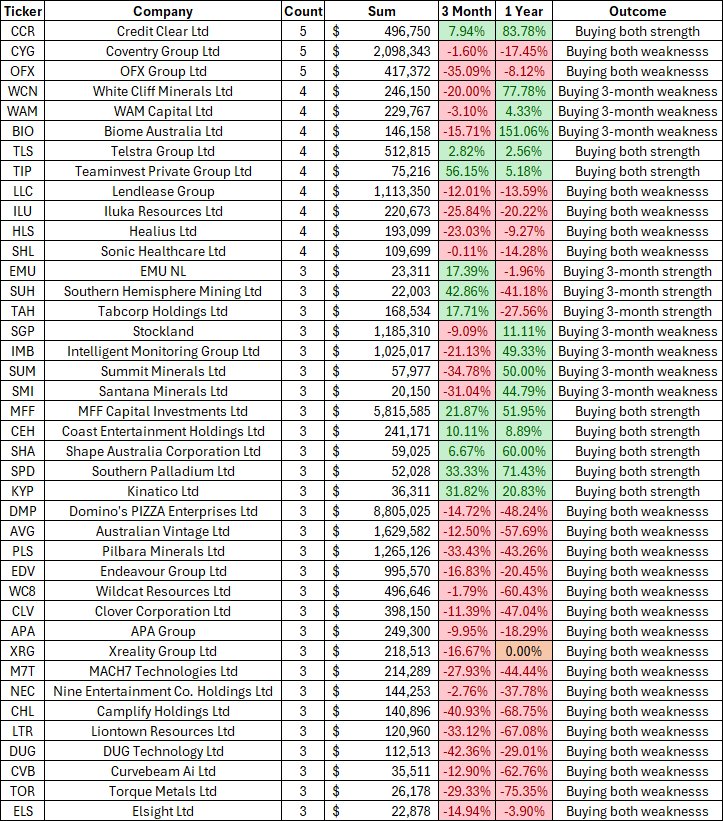
- Of the 40 sets of transactions that involved NET BUYING, 22 of them saw that buying on both 3-month and 1-year weakness - This is once again the dominant category in the data, which plays into the research outlined above, i.e. these are insiders buying when their stock is 'cheap'
- Eight instances saw insiders buying on both 3-month and 1-year strength - these are the momentum riders
- Seven instances saw insiders buying on 3-month weakness (despite 1-year positive performance) - this cohort is 'buying the dip'
Transactions that involved NET SELLING

- Of the 10 sets of transactions that involved NET SELLING, four instances saw insiders selling on both 3-month and 1-year weakness - perhaps getting out whilst they still can (although there are some caveats, more below)
- Three instances saw insiders selling on both 3-month and 1-year strength - these are insiders selling when their stock has rallied
- Two instances saw selling on 3-month weakness but ultimately crystallising longer-term gains
The big counts
BHP Group (ASX: BHP)

In the December quarter, BHP had the highest count of six directors making insider moves and whilst the NET value of trades equaled SELLING, that doesn't tell the whole story.
The data was skewed by a big sale from BHP CEO Mike Henry, who sold down a circa $2.6 million parcel. Meanwhile, five other directors were actually buying. As noted above, one can never know the reasons why a director buys or sells, we can only analyse the data. On balance, I would humbly submit that five directors buying is a stronger signal than the CEO selling, particularly when the CEO is likely to hold a larger total amount of shares in the first place.
Interestingly, all of the transactions occurred within a fairly tight window, from late October through mid-November. Unfortunately, BHP shares continued to slip in the past two months due to falling iron ore prices.
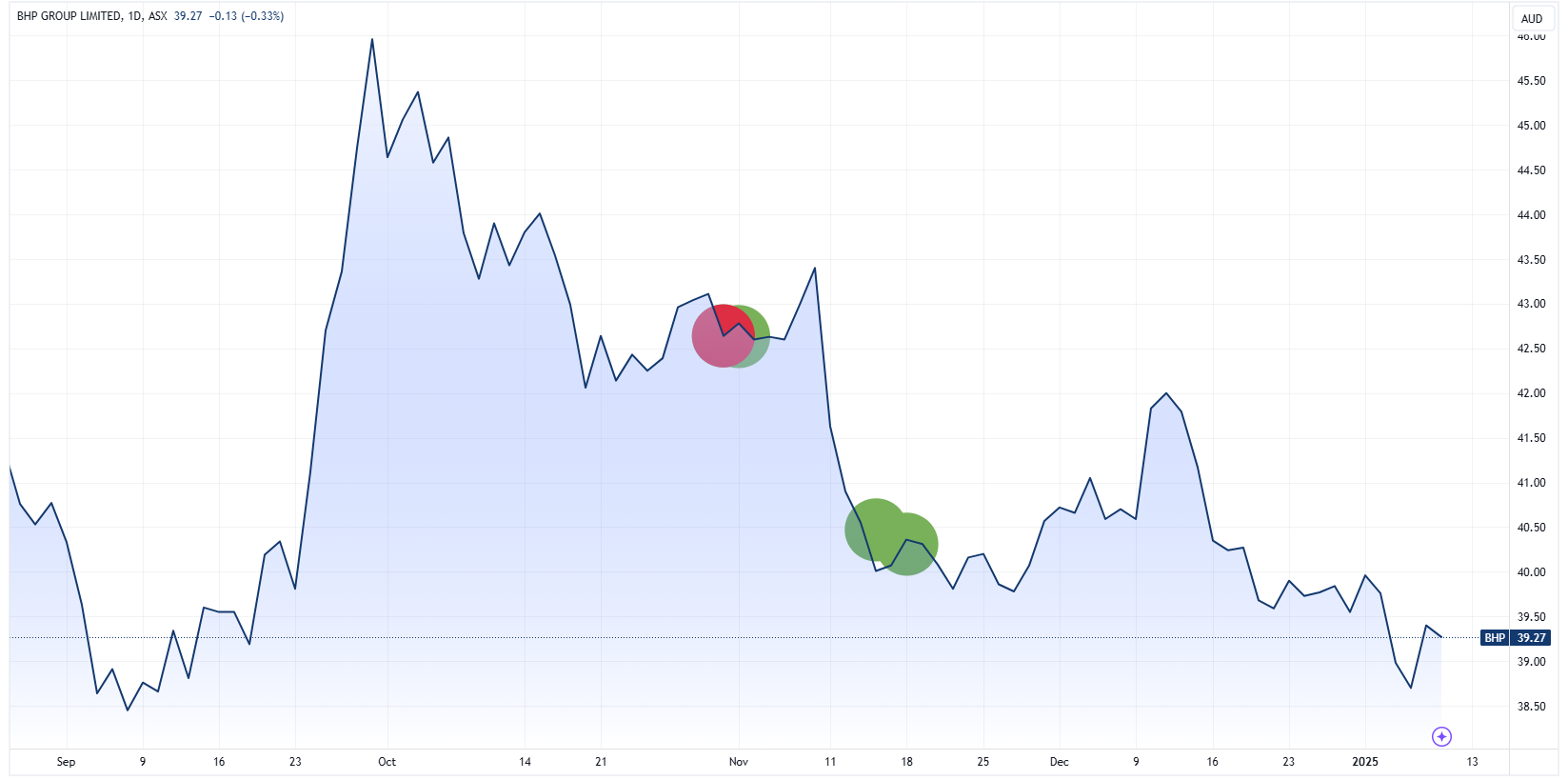
Credit Clear (ASX: CCR)
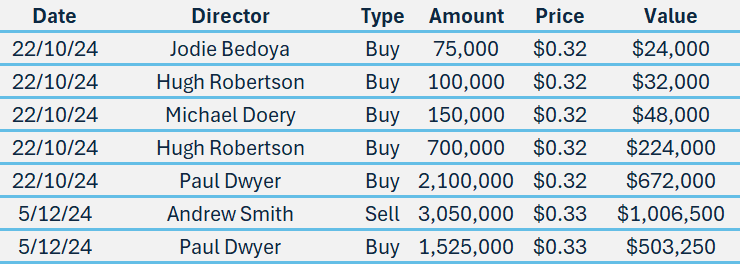
In the December quarter, CCR had five directors making insider moves and, once again, one director was selling a large parcel with the rest buying (please note, in the table above, all transactions are presented, including the same director multiple times).
For context, the selldown from CEO Andrew Smith relates to "assisting family with personal matters", with "no further plans by directors to sell shares." The three million shares sold by Mr Smith were bought by Chairman Paul Dwyer and a large institutional investor.
Credit Clear is a fintech company that provides a digital platform for managing customer accounts receivables. The company serves over 1,000 clients including blue-chip companies and government departments like TPG Telecom, AGL Energy and Suncorp Group.
The stock was in a major downward spiral between November 2020 and November 2023, down as much as 82%. It has since stabilised and up around 80% from its lowest point.
Credit Clear appears to have found some momentum in revenue growth and client onboarding. In October 2024, the company said it was "on track to meet or beat FY25 guidance" and again reaffirmed this view in November.
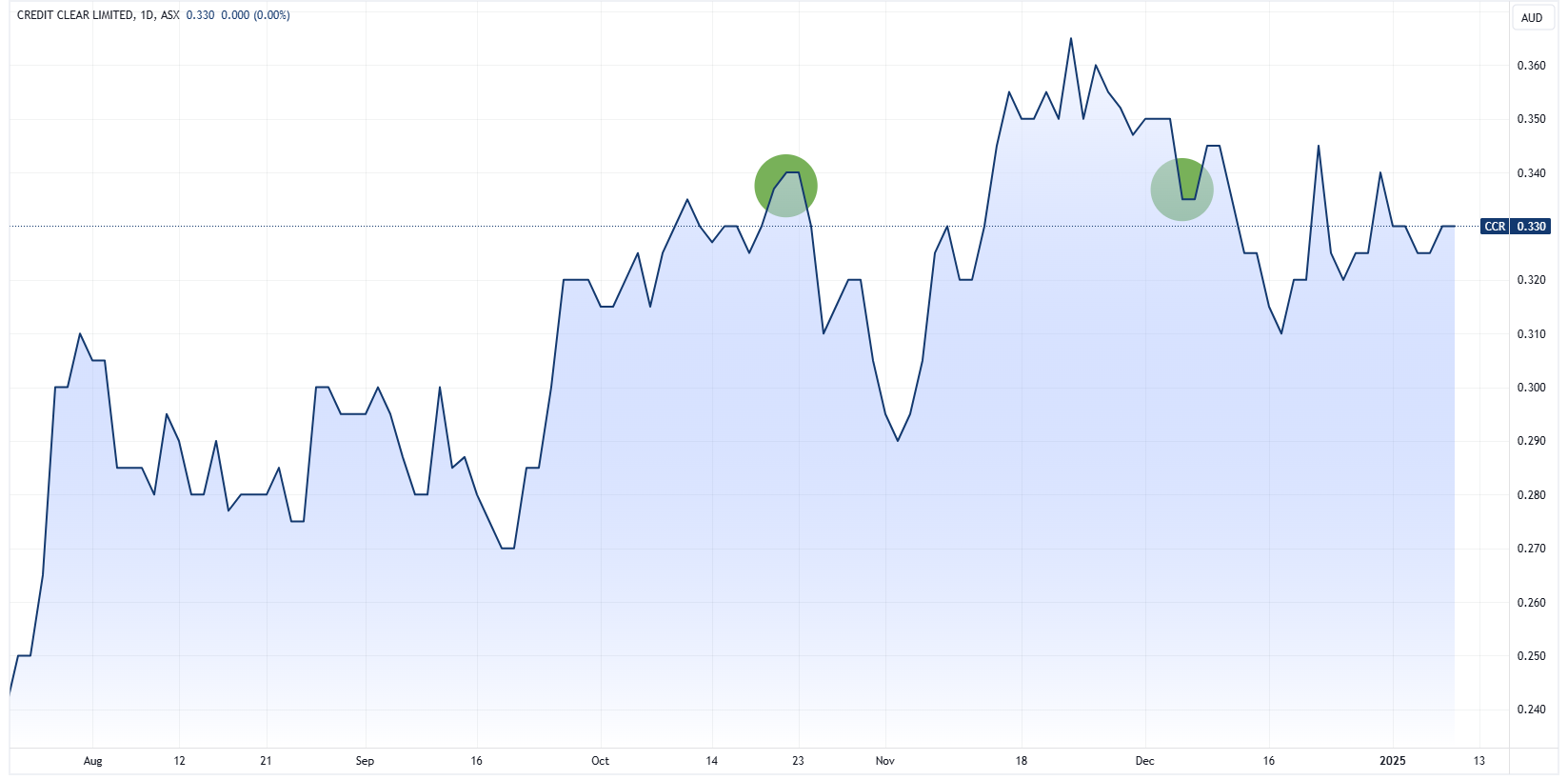
Coventry Group (ASX: CYG)
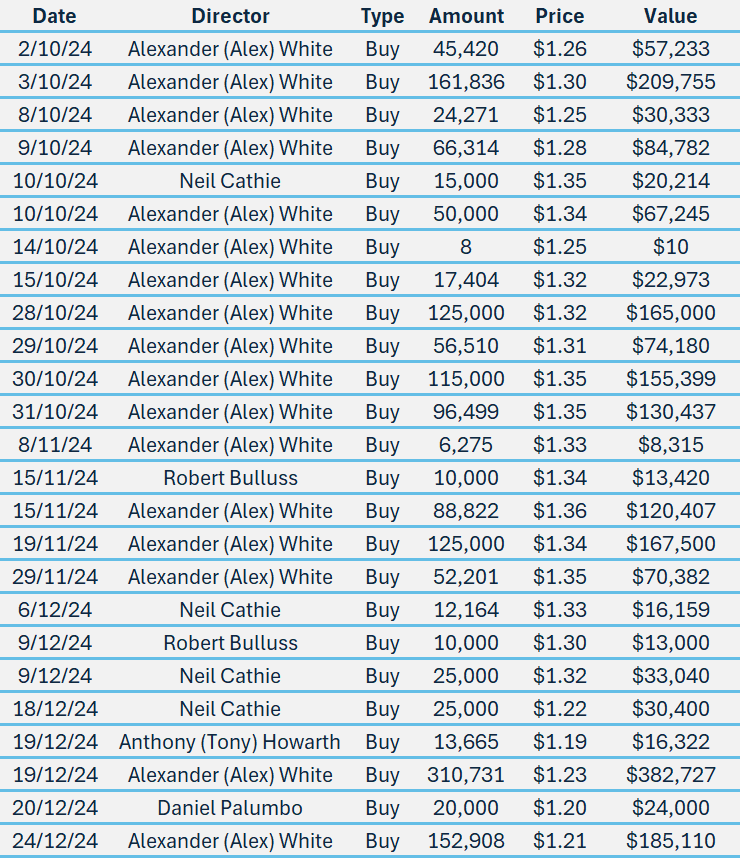
In the December quarter, CYG had five directors making insider moves, but this time, it was wall-to-wall buying - no sellers here. Interestingly, the buying occurred over the entire quarter, right up until Christmas Eve.
Coventry distributes industrial products and services throughout Australia and New Zealand. The company's product range includes fastening systems, cabinet hardware systems, hydraulics, lubrications, fire suppression, and refuelling systems.
A vast majority of the buying was done by Non-Executive Director Alexander White. Mr White is also the Director and Portfolio Manager of Richmond Hill Capital (formerly Viburnum Funds). The fund is a high conviction investment management firm based in Melbourne and seeks to invest in a "focused, concentrated and long-term equity investment strategy."
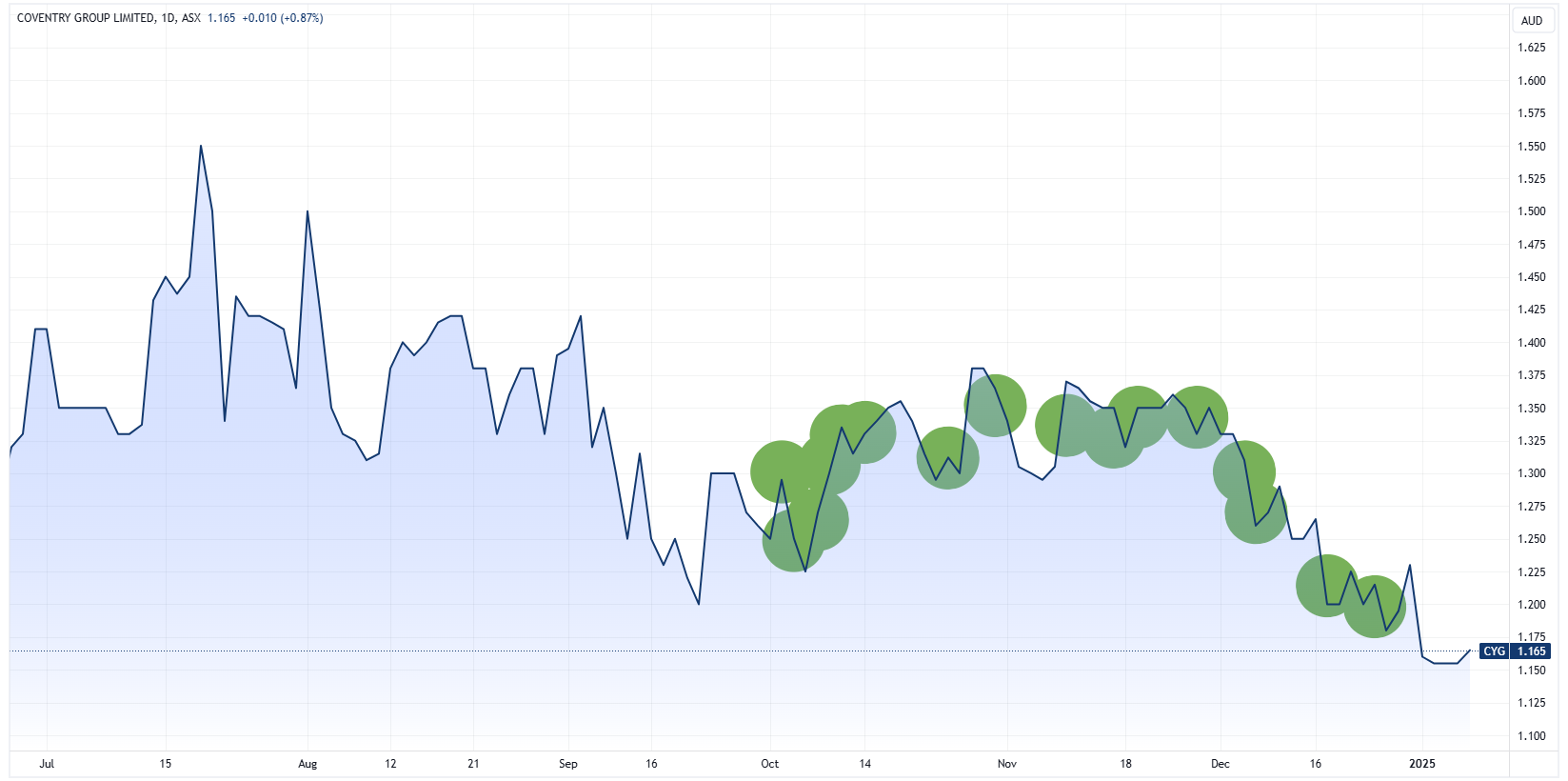
OFX Group (ASX: OFX)

In the December quarter, OFX had five directors making insider moves. Once again, it was nothing but buying across the board.
Interestingly, the OFX share price was hammered in mid-October on the 1H25 Trading Update announced to the market, but directors bought stock post the 1H25 Results Presentation on 12 November - perhaps another case of directors being adept at buying when their stock is cheap? Time will tell.
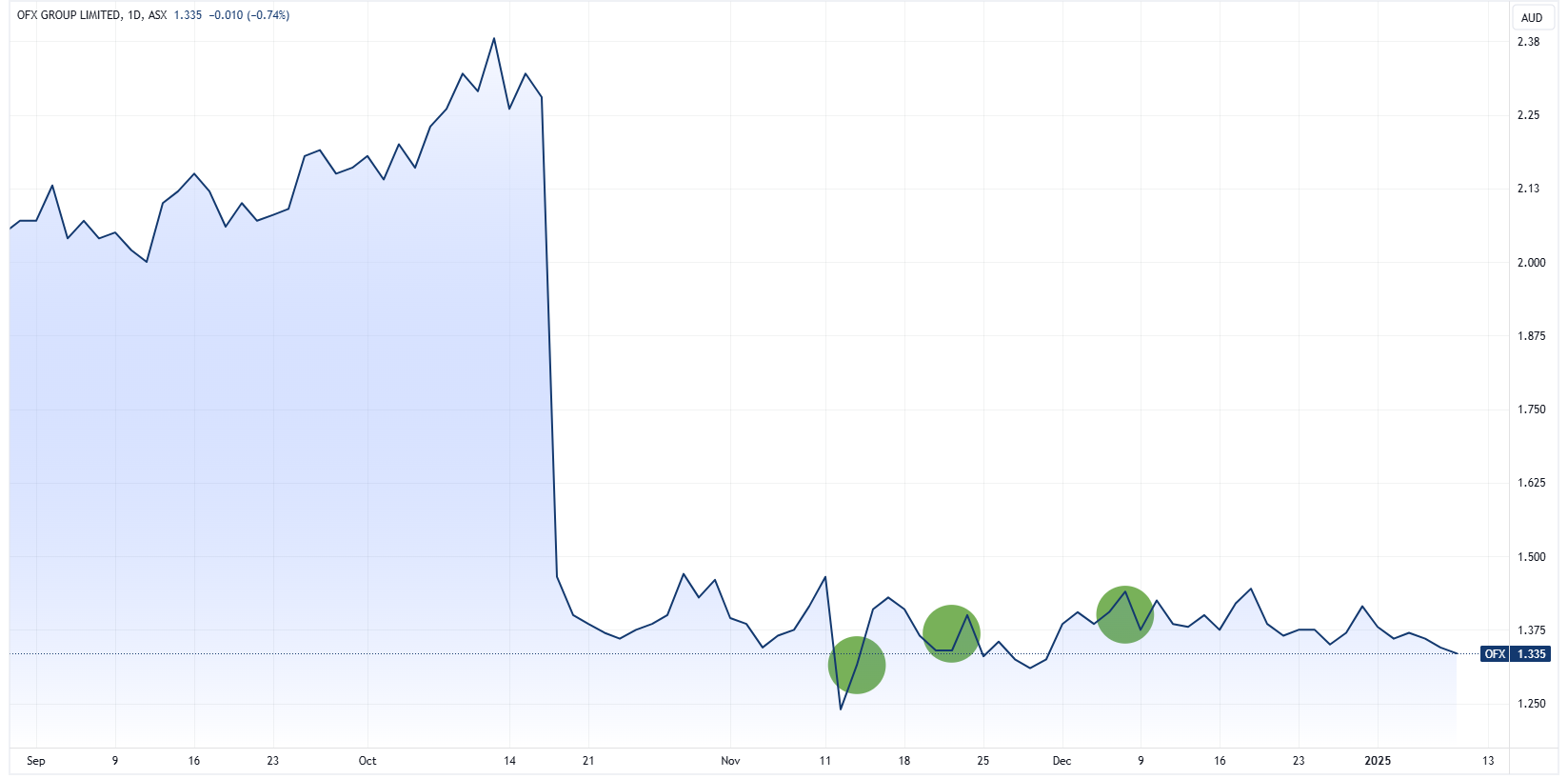
The Big Hitters: Pro Medicus, Wisetech and Netwealth
The founders and CEOs of Pro Medicus (ASX: PME), Wisetech (ASX: WTC) and Netwealth (ASX: NWL) sold $513.6 million, $144.7 million and $139.3 million, respectively. The three stocks are up an average of 108% in the past twelve months, so it would be fair to say that while the percentage ownership from the key shareholders has dropped, the dollar value of their holdings has likely risen.
Pro Medicus has emerged as one of the market's best growth stories. Its net profit has grown at a compound average growth rate of 38% in the past decade despite mainly focusing on the North American market. The company's co-founders, Dr Sam Hupert and Mr Anthony Hall, own approximately half the company and have a unique way of offloading shares.
A block trade typically warrants a discount to compensate the buyer for risks such as liquidity concerns, market impact and share price volatility. The discount can vary dramatically, but generally around 3-10%.
The co-founders have managed to offload $513 million worth of shares at zero discount. In the selldown announcement, the company said, "The sale was in response to strong approaches from a number of high-quality funds."
Interestingly, Pro Medicus is currently trading at a price-to-earnings of 335x, up from 138x a year ago. Its 10-year average is 99x. The stock is trading at its most expensive point in history and yet institutional players are willing to buy a significant shareholding at no discount.
Wisetech has been subject to its fair share of controversies last year, weighing on its recent share price performance. Founder Richard White owns approximately 38% of the company and has a unique way of offloading shares.
During his most recent interview with Livewire, Mr White said his transactions were taking place on a daily basis.
"Making a small daily trade, in a very orderly way and reporting it every week ... means that people can see that liquidity is coming to the market," he said.
Mr White said he had been approached numerous times by various investor groups asking if he would sell them a block.
"I'm unwilling to do that because I want the market to be very calm. A block is very noisy, comes at a big discount, and requires a lot of effort to do."
Netwealth is another spectacular growth story, leveraging the structural shift within the Australian wealth management platform industry. The total addressable market for platform providers like Netwealth and Hub24 is estimated to be $1.1 trillion as of March 2024, up 11.5% year-on-year, according to PFL Research.
On 28 November 2024, Netwealth reported $100 billion in funds under administration, leaving ample room to take market share within the market.
CEO Matt Heine and Director Michael Heine have a tendency to sell $20-70 million around August and November every year for the past six years. This has likely dulled the market's reaction to what is otherwise a sizeable selldown.
In September 2019, Michael Heine sold 7.1 million shares at $7.70 a piece ($54.6 million in total). At today's price, the same parcel is worth approximately $213 million.
5 topics
3 stocks mentioned
1 contributor mentioned

